Establishing a relationship with your rat’s vet is an invaluable part of keeping your rat healthy and happy. Because rats are prone to developing so many ailments, it’s particularly crucial to find a vet who’s qualified to care for rats and who thoroughly enjoys doing so. Once you find a great pet rat veterinarian, you’ll understand completely how crucial it is to work with someone who wants to help keep your rats as healthy as you do. Each time a new problem arises, my rats’ veterinarians have been instrumental in researching new options for treatments and making sure we’re doing everything possible.
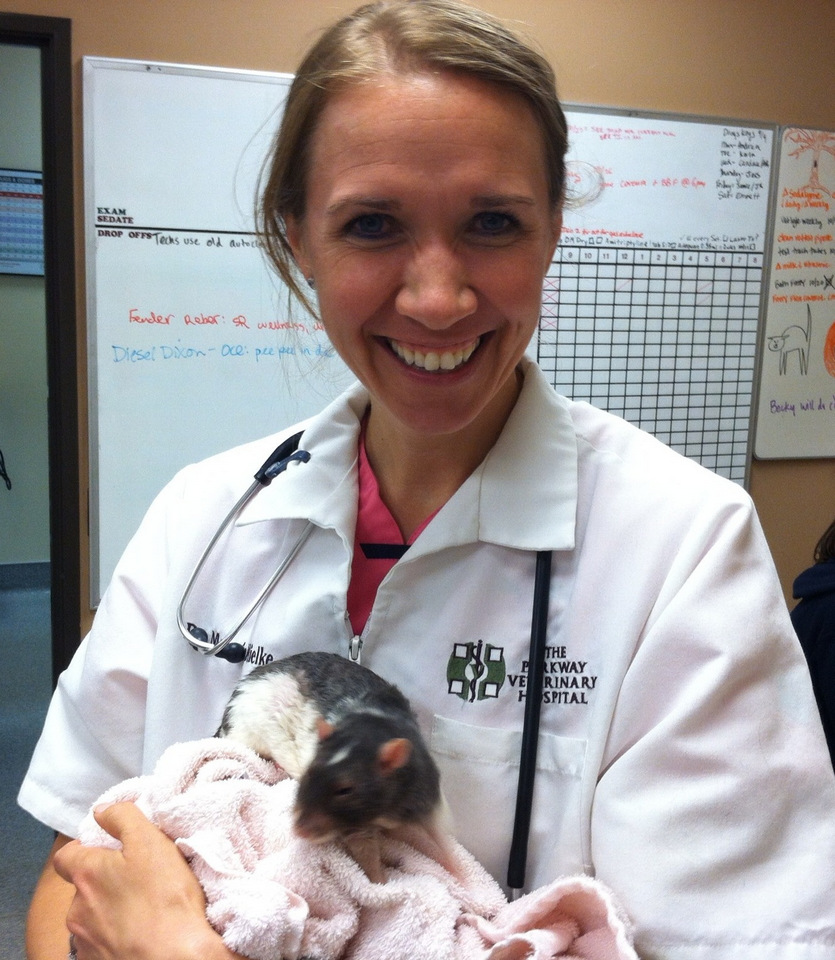
How do you choose a great pet rat veterinarian?
Ask other rat lovers in your area where they take their rats for veterinary care. Word of mouth is the best way to find a qualified rat vet. If you can’t find anyone to ask, find out if there’s a nearby rat club or meetup or even a Facebook group and ask the members what rat vets they recommend. If you have other types of pets, ask the veterinary staff where you take your dog(s) and/or cat(s) if they know of good rat vets. In the event your veterinary hospital doesn’t have an exotics vet, they should have a list of nearby veterinarians who see rats.
There are also many online resources: Rat forums and rat veterinarian directories can help you find a good pet rat veterinarian. Keep in mind, however, the directories don’t always list all the vets who see rats in your area. They’re also not always kept up to date. Word of mouth is best but, if that’s not possible, here are some online directories.
One other way online in which I often help people find a good vet in their area is to open Google Maps and type in your address. Then type in “veterinarian”. Once the veterinary hospitals pop up on the map you can click on the hospitals that are close by. From there you can go to that hospital’s website and find out if they see exotics. It takes a little longer to look for a vet using this method, but sometimes it’s very helpful. Sometimes you will end up having to travel a little farther than you’d like. Great pet rat veterinarians are not as common as dog and cat vets. Even so, driving an hour each way for appointments may be well worth it.
If you’re absolutely unable to find a pet rat veterinarian within driving distance, see if your rat can be seen by a doctor who’s willing to consult with an exotics vet in another town. Some veterinarians welcome the opportunity to learn. They will be excited about working with you while consulting with a more knowledgeable, exotics-focused veterinarian.
More than one vet is preferable
I believe it’s extremely important to have a relationship with more than one pet rat veterinarian. This will come in handy when one of your vets is on vacation or has the day off. It is also important to find out what emergency clinics in your area see rats. Once you establish a relationship with your rats’ veterinarian, be sure to ask what emergency vets in your area they recommend for your pet rats.
 How do you know when you’ve found an excellent pet rat veterinarian?
How do you know when you’ve found an excellent pet rat veterinarian?
You’ll know you’re working with someone great when they do a thorough exam on your rat while at the same time expressing their love and enjoyment of rats, especially your rat. A thorough exam consists of listening to your rat’s heart and lungs using a small stethoscope (smaller than the size that’s used for dogs and cats), palpating your rat’s body to check for swollen lymph nodes and to feel internal organs, checking your rat’s teeth for proper length and alignment, examining your rat’s eyes, ears, fur and skin. If you’re not convinced you’ve found your rat’s best possible vet, try a different one. The comparison between the two doctors will help you decide.
When should you take your rat to the vet?
As soon as you bring a new rat home, an exam by a qualified veterinarian is crucial in assessing and recording each of your rat’s base-line levels of health. This should be done within the first 1-2 weeks of bringing your new rat(s) home. When examining your new rat, your vet can often spot things you may not have even noticed. Your rat’s first wellness visit is also a great way to establish going to the vet as being a routine event. Your rat will think it’s normal to be examined and won’t be fearful if they’re used to going to the vet. In fact, I take my rats to the vet for an exam at least every six months and even more often when they grow older—whether or not I observe any symptoms or signs of illness.
Besides initial and regular wellness exams, here are some symptoms which indicate your rat must be seen by a veterinarian:
- Any increase or decrease in appetite, thirst, urination or activity level (Is your rat sleeping more than normal? Not wanting to play?)
- Diarrhea or constipation
- Puffed up fur
- Sneezing
- Any breathing problems – Does your rat sound congested or make wheezing sounds? A healthy rat’s breathing is silent. Does your rat’s breathing seem labored? (i.e. does his/her body heave in and out while breathing?)

- Porphyrin – Porphyrin is a red secretion around the eyes and nostrils that looks just like blood. It’s produced by the Harderian glands, located behind each eye. Porphyrin is a sign that the rat could have an infection or be experiencing stress
- Any eye problem – Squinting, cloudiness, scratching, redness
- Any wounds – many rat owners insist that rat lacerations heal quickly and on their own. However, there’s always a chance of infection. I would never neglect taking my rat to the vet when they have a laceration. Veterinarians will often prescribe an antibiotic for a rat with wounds to ward off or get rid of infection. In addition, the last time one of my rats was wounded, the emergency room veterinarian found the gashes were far more significant than what I’d initially observed. If I hadn’t taken him to the vet, my rat’s wounds could have become infected and may not have been able to heal on their own.
- Abscesses, lumps or bumps – Small lumps can be abscesses filled with pus or a tumor (cancerous or benign). In my opinion any lump found on your rat should be examined by a veterinarian within 24 hours if possible.
- Excessive scratching/itching
- Scabs
In short, if you see anything out of the ordinary, any significant changes in your rat’s behavior and/or health, take him or her to a qualified veterinarian. I would much rather have the vet say “everything’s fine” than not take my rat in and find out I could’ve caught a problem early and prevented a worse condition from developing or even an unnecessarily early death.
Your rat’s vet is on your team
I like my rats’ veterinarians so much I look forward to taking my rats in for their exams. There are massive advantages to having an established relationship with your rats’ vet. Because they already know my rats, I can often call or email to get information without needing an appointment. I can also usually get an appointment a lot sooner since they know my rats. This isn’t something you can do if you don’t already have an established relationship with your rat’s vet. Remember your veterinarian is on your team. They make significant contributions toward keeping your rat happy and healthy for as long as possible.
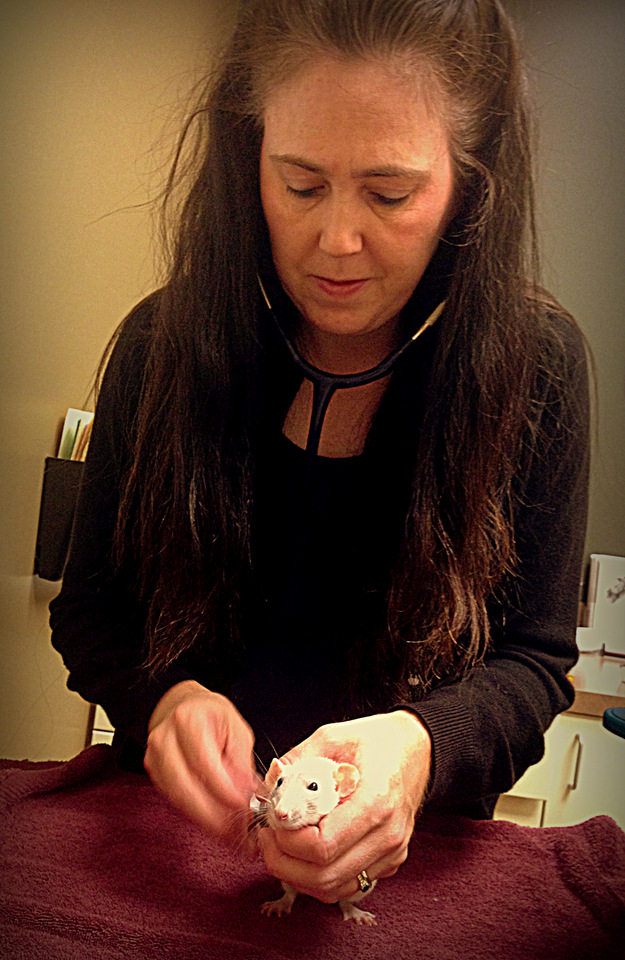
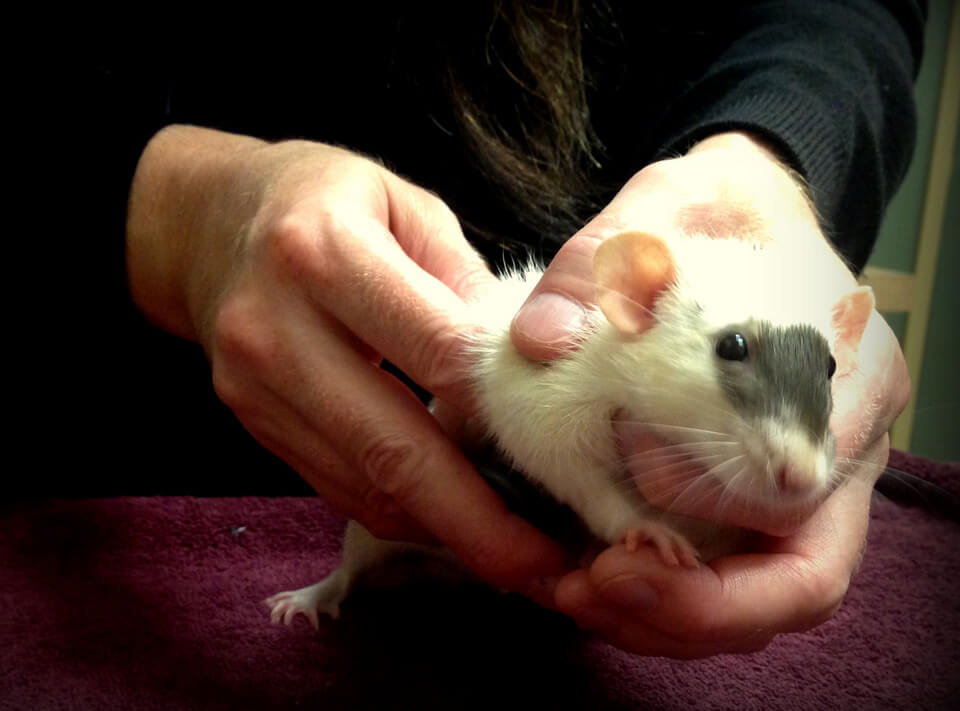


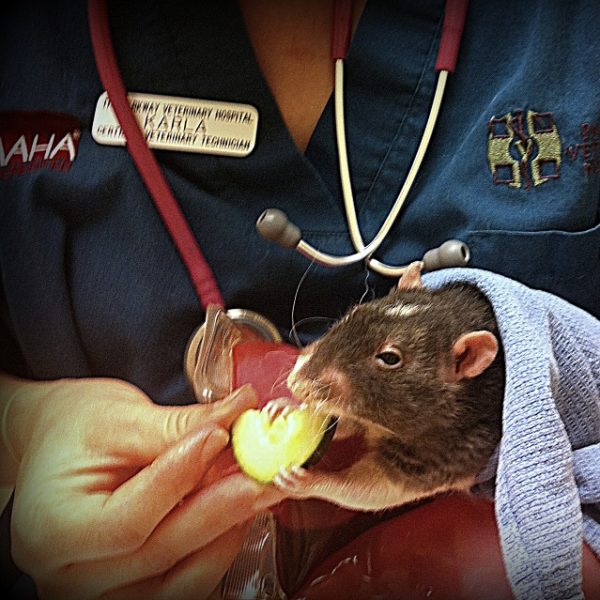
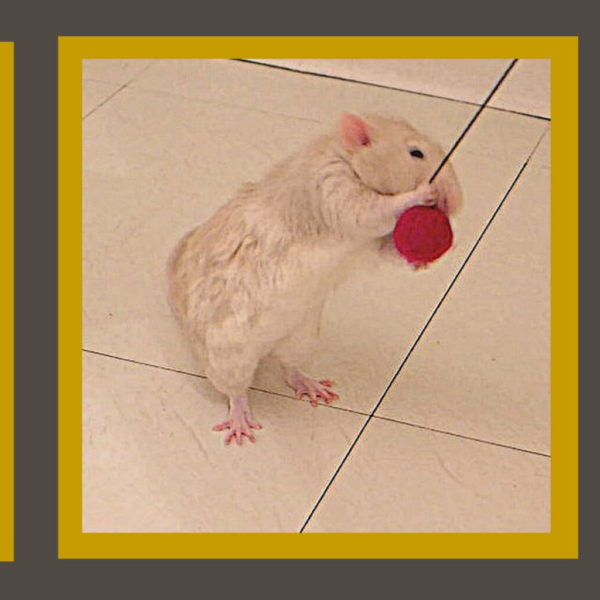



This is very interesting. I guess I never thought about smaller mammals needing to go to the vet, but I guess they do.
Hi There!
Many people are unaware of the health care needs of their pet rats…..which is why I’m on a mission to help get the knowledge out there! It took me years to learn recognize all the signs and symptoms. There are so many illnesses pet rats can get and they are so different from cats and dogs.
Thanks so much for stopping by.
Best Wishes to You & Your Fur Kids,
Jasmine | About Pet Rats
This is so very interesting. I do not have experience with rats. We have cats, a dog, and a rabbit. We have a great veterinarian for Lulu, our rabbit. Unfortunately, I think many people still think rabbits, rats, etc. do not need vet care. Thanks for helping educate us!
P.S.: Thanks for your lovely comments on my post. I really appreciate your kind words!
That’s so great you have a wonderful vet for Lulu, your rabbit! I agree, not everyone understands that it’s not just dogs and cats who need veterinary care. I’ll never forget working in a veterinary hospital when a pet owner was surprised at the cost of her pet rat’s exam. She said, “Why should I pay that much for an exam when my rat only cost $5?”
For anyone interested, check out The Daily Pip and read the post on Lucas (referred to in The Daily Pip’s “PS” above)
Best Wishes to You & Your Fur Friends!
Jasmine | About Pet Rats
As a CVT, I remember handling a lot of rats and they’re sensitive! It’s excellent to educate folks on things to look for and signs that they might be sick since the can be really subtle…
Hi Christy!
What you wrote is so true—-rats are very sensitive and it takes time to learn the signs and symptoms of ill health.
I’m in Portland, too, by the way!
Best Wishes to You & Your Furry Friends,
Jasmine | About Pet Rats
I don’t have a rat, but I happen to know an wonderful small animal and exotics vet. It’s super important for any animal owner to have a good relationship and trust their vet. Great post!
Right on, Heather! Thanks for your comment and for stopping by. Nice to hear you agree and understand the importance of having a good, trusting relationship with one’s vet.
Best Wishes to You & Your Furry Friends,
Jasmine | About Pet Rats
As a teenager I used to have a pet rat and I can relate how difficult it is to find a good rat vet (or exotic pet vet in general) – great post!
Thanks for your comment! Where would us pet lovers be without great veterinarians?!
Huh. Something I never thought about. I guess Rats are not as common as cats or dogs so it would make complete sense to find a vet that knows this species! Interesting post!
Thanks for your comment—It really does make a huge difference to find a veterinarian who’s knowledgeable and experienced with pet rats. I’ve had so many rats helped by great vets….There’ve been many times I had no hope and the veterinarian was able to save my rats thanks to their wonderful skills and expertise.
It seems that rats are becoming very popular pets.
I can understand why! :)
I hear from people that finding a good exotics vet is hard! I think most of the clinics around here only do dogs and cats.
Very true! It’s especially difficult when you’re new to pet rats since you don’t have enough experience to help you know whether or not you’ve found a good vet. One of my main motivations for creating this website is to help new pet rat owners learn about potential health problems and how to find and choose the best veterinary care.
Thanks for stopping by!
Take Care,
Jasmine | About Pet Rats
I don’t have a rat, but this is a great, thorough blog for anyone who does. My daughter went through something similar looking for a vet for her ferrets.
Hi Robbi,
Thanks for stopping by and commenting! Sounds like your daughter is a great ferret mom. Having a knowledgeable, experienced vet makes all the difference in the world.
Best Wishes to You & Your Fur Kids,
Jasmine | About Pet Rats
This is a really great post – I particularly liked the piece about how do you know when you’ve found a good rat veterinarian! Rodent care is similar yet different than canine, so great tips!
Thanks so much for your comment. So true that rat care is “similar yet different” than for canines.
Best Wishes to You & Your Fur Kids,
Jasmine | About Pet Rats
This is great info for rat parents. I know we had several rat clients at the vet clinic I worked at a few years ago. I always enjoyed their visits.
Thanks for your comment, Lisa! That’s wonderful you worked in a vet clinic—such a great way to learn more about the animals we love.
Best Wishes,
Jasmine | About Pet Rats
I love rats! I have thought of getting one of my own. I’ve had lots of other rodents: guinea pigs, mice, hamsters and gerbils but never a rat.
Do they get immunizations like dogs and cats do?
And how long do they live?
Hi Cathy,
Rats are so much fun! They’re extremely intelligent—they can be litter box trained, come when you call them and easily learn tricks. Males are especially cuddly and loving while the females will keep you laughing with their constant motion and antics. Most enjoy riding on your shoulder while you walk around indoors.
They do not need immunizations, but they do often need a lot of veterinary care. They’re prone to respiratory disease and females frequently develop tumors (unless they’re spayed).
Females live from 2-4 years and males live 2-3 years. Their life spans vary greatly (as with all pets and humans) depending on how well they are cared for: Quality Diet, Housing, Mental Stimulation and Veterinary Care are all ways we can help them live longer.
Thanks so much for your comments and questions!
Best Wishes to You & Your Fur Kids,
Jasmine | About Pet Rats